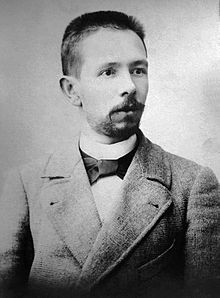Vasily Sergejewitsch Kalinnikow
Vasily Sergeyevich Kalinnikow ( Russian Василий Сергеевич Калинников , scientific transliteration. Vasilij Sergeevič Kalinnikov * 1 . Jul / 13. January 1866 greg. In Woiny , Oryol Governorate , † December 29, 1900 jul. / 11. January 1901 greg. In Yalta ) was a Russian composer .
Life
Kalinnikow, the son of a police officer and older brother of the composer Viktor Sergejewitsch Kalinnikow , came from a poor background. From 1879 he attended a theological seminar in Oryol , where he was soon allowed to lead a choir. In 1884 he began studying music at the Moscow Conservatory, which he had to drop out for financial reasons. A scholarship enabled him to study composition and bassoon at the school of the Moscow Philharmonic Society from 1885, which he finished in 1892. On the side he worked as a copyist and assistant musician in various orchestras. In 1892, through Pyotr Tchaikovsky's mediation, Kalinnikov received the post of conductor at the Small Theater in Moscow. In 1893 he became an assistant conductor at the Italian Theater. Due to his living conditions, which were marked by great hardship, however, he soon fell ill with tuberculosis . He spent the last years of his life in the Crimea , where he hoped that the climatic conditions there would alleviate his illness. He lived on a small pension from the Moscow Philharmonic Society. His financial situation eased somewhat towards the end of his life when Sergei Rachmaninoff stood up for him and found a publisher for his works.
Audio language
Although Pyotr Tchaikovsky and Alexander Borodin can be recognized as role models , his music has a very independent character. Kalinnikov's talent is particularly evident in his very imaginative and catchy melody. His orchestration is always colorful and full of sound. In his larger-scale works, he attached great importance to an intensive cyclical linking of the individual movements. It is particularly noticeable that his music has an extremely positive mood and appears downright optimistic, although it was created in the face of his incurable disease. Kalinnikov received some attention during his lifetime and was valued by important musicians such as Sergei Rachmaninoff and Fyodor Chalyapin . After his death, his fame declined significantly. In the early 1950s, however, Kalinnikow experienced a renaissance, as his music in many ways matched the state-required aesthetics of socialist realism .
Anthem of the USSR
In Kalinnikov's work “Bylina” ( Fairy Tales ) there is a motif that is extremely similar to that of the Soviet hymn . Alexander Wassiljewitsch Alexandrow , who is known as the composer of the work , was therefore accused of plagiarism in Kalinnikov's orchestral work.
Works
- Orchestral works
- Symphony No. 1 in G minor (1895)
- Symphony No. 2 in A major (1897)
- Suite in B minor (1892)
- Fugue in D minor (1889)
- "The Nymphs", symphonic picture (1889)
- Overture in D minor (1894)
- "Cedar and Palm", symphonic picture (1898)
- 2 interludes in A major (1896) and G major (1897)
- Serenade in G minor for string orchestra (1891)
- Bylina, Overture (ca.1892)
- Incidental music for "Tsar Boris" (1898)
- Vocal works
- "In the year 1812", unfinished opera (1899/1900)
- Works for choir
- Songs
- Piano music
- smaller pieces
Web links
- Catalog raisonné - but has some inconsistencies
- Picture gallery
- Sheet music and audio files by Vasily Kalinnikow in the International Music Score Library Project
| personal data | |
|---|---|
| SURNAME | Kalinnikow, Wassili Sergejewitsch |
| ALTERNATIVE NAMES | Калинников, Василий Сергеевич (Russian); Vasilij Sergeevič Kalinnikov |
| BRIEF DESCRIPTION | Russian composer |
| DATE OF BIRTH | January 13, 1866 |
| PLACE OF BIRTH | Woiny , Oryol Governorate |
| DATE OF DEATH | January 11, 1901 |
| Place of death | Yalta |
